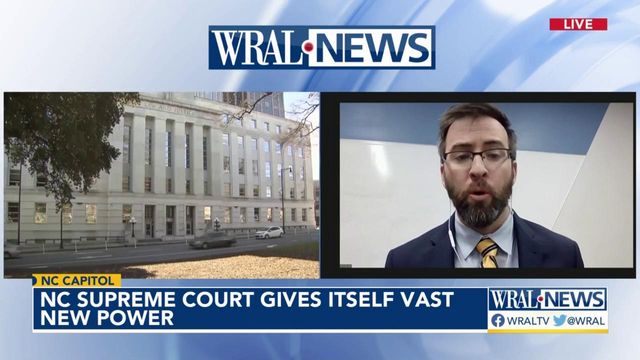In three sentences, NC Supreme Court gives itself vast new power
North Carolina’s Supreme Court gave itself new powers in a ruling last week, leading the court’s two Democratic members to cry foul.
The case was about whether Durham police officials erred in firing an officer who defused an armed standoff with a promise of marijuana. But the real importance wasn’t about cops and pot. Rather it’s about the new power the court invented for itself in handing down its ruling.
When the case ultimately made its way to the Supreme Court, the justices were at a loss for what to do. There were multiple legal issues and no clear consensus on how the court should rule.
“The justices’ questions revealed several alternative ways to decide the case, none of which could be reconciled with the others,” Republican Justice Richard Dietz wrote.
So he and the rest of the court’s GOP majority responded by simply punting on the decision. In an unsigned, three-sentence opinion, the high court let the Court of Appeals ruling stand, but unpublished it. That means the ruling can’t be cited as precedent in future employment cases.
The dissenting Democrats criticized it as the easy way out. Justice Michael Morgan wrote that because the GOP majority felt “discomfort” with some of the issues the case raised, their decision allows “the majority to proverbially bury its head in the sand and to neglect this Court’s obligation to answer necessary constitutional questions through the interpretation of state law.”
But for Morgan and the court’s other remaining Democrat, Justice Anita Earls, the decision to punt on the ruling was not the most concerning aspect of the case.
They’re far more concerned with the procedural move the Republican majority used to unpublish the Court of Appeals opinion — a move Morgan called an unprecedented power grab.
The exact procedural move is incredibly rare, and usually reserved for niche circumstances — none of which were present in this case. The Democrats worry that this case is the GOP majority inventing a new ability for itself to unpublish Court of Appeals opinions at any time, under any circumstances — and without having to explain why.
“The Court is making a hasty and unexamined, yet fundamental and radically destabilizing shift in the authority to determine legal precedent,” Earls wrote in her dissent against the decision. “It has far-reaching implications for the jurisprudence of this state.”
WRAL reached out to Dietz, Earls and Morgan, offering them the opportunity to provide further comment. None responded; justices typically don’t speak publicly about issues before the court.
Power grab, or sensible solution?
Earlier this year, WRAL News reported that the court’s new Republican majority was considering ways to expand its power, according to leaked notes from a private presentation Earls gave to the North Carolina Bar Association Board of Governors.
One of those plans was for the court to give itself the power to unpublish opinions from the Court of Appeals. It now appears to have come to fruition in this unheralded opinion — and not the sort of years-long, public review process that’s typical for other changes to the state’s appellate rules.
In legal parlance, published opinions can be cited as precedent for future cases. Unpublished opinions, almost always, cannot.
So shifting the power to unpublish Court of Appeals opinions away from that court, and giving it to the Supreme Court instead, gives the Supreme Court more power to shape the state’s legal precedent. That could let the court’s political majority, now or in the future, have even more say on issues relating to everything from election law to criminal appeals, business disputes and more.
The Court of Appeals rules on so many cases that the Supreme Court couldn’t possibly rule on them all even if it wanted to. So the new power hypothetically gives the court more ability to reach down and defang rulings that whichever party might one day control the court dislikes — even if it has neither the time nor the legal grounds to do so in a more formal ruling.
“I do not agree with this majority’s departures from well-established and time-honored practices, traditions, and customs of this Court merely because these deviations conveniently serve the majority’s interests,” Morgan wrote.
Dietz, sticking up for his fellow Republicans, wrote a concurring opinion that he said was a response to concerns raised by Morgan and Earls.
Dietz wrote that unpublishing cases is rare but it has happened before, responding to Morgan: “But the point is that ‘unpublishing’ a Court of Appeals opinion is far from unprecedented.”
Despite their disagreements on what the court’s power should be moving forward, Morgan and Dietz each acknowledged that when the court has unpublished opinions in the past, it has only ever been in niche circumstances — like if only a few justices heard the case due to recusals, or if the vote on the case somehow ended in a tie.
Judges’ back-and-forth
Beth Scherer, an attorney with Fox Rothschild and an expert on state appellate procedures, said the idea is that if the state’s highest court can’t come to a truly definitive ruling, it should leave the matter for another day.
“This is rare,” she said. “... But that happens a couple times a year.”
And while Morgan and Dietz engaged in a war of words in their hotly written parts of the opinion, Scherer said it’s really just a difference of perspective. The Supreme Court has wide latitude to make its own rules, she said. That often happens behind closed doors, but this time it’s out in the open.
“It's just a difference in opinion on what some practices mean — and what they should mean, moving forward," Scherer said.
Neither Earls nor Morgan were as measured. In addition to Morgan’s critiques, Earls wrote her own lengthy dissent. Much of it was technical and historical analysis, but she also added a barb: Because of the twisted logic the GOP majority tried using to excuse its power grab, Earls wrote, Dietz’s defense of their actions ends up offering self-contradictory excuses.
“The majority’s effort to hide the ball through sleight of hand is all the more appalling because having moved the cups around, they can’t remember where it is,” she wrote.
Dietz, however, said that if they tried forcing their way into a ruling in this case it might have just made everything more complicated for future judges to untangle.
“If there is no majority for any one approach in the voting conference, the result is often a series of plurality and minority opinions that are a complete mess to decipher,” he wrote. “Moreover, those competing opinions can make the law less settled and make the surrounding confusion about the law even worse.”
He added that as a former member of the Court of Appeals he doesn’t love the idea of the Supreme Court swooping in and unpublishing their opinions. It is a power that should only be used sparingly, he wrote.
“Having said that, there is precedent for taking both of these steps,” he wrote. “And there will be rare cases where it is appropriate for this court to do so because doing otherwise would only make things worse.”












